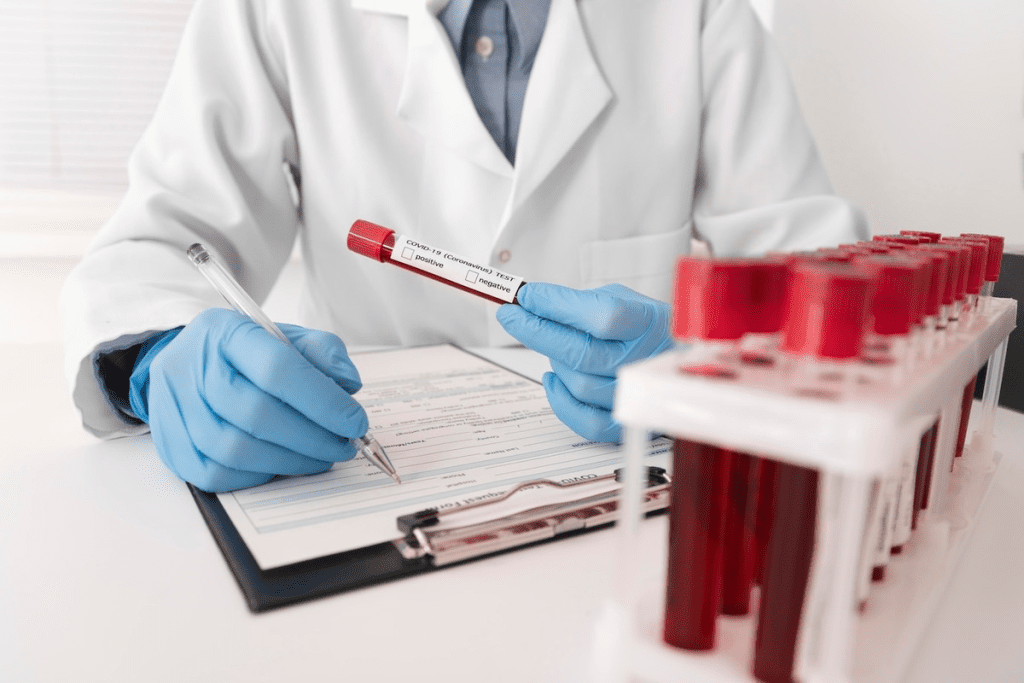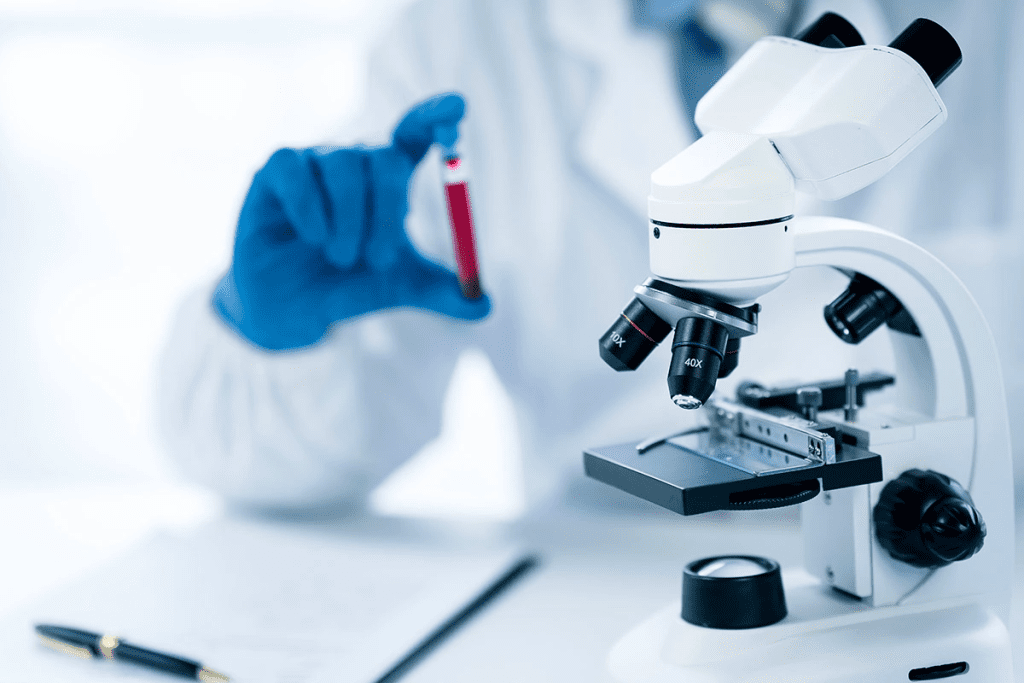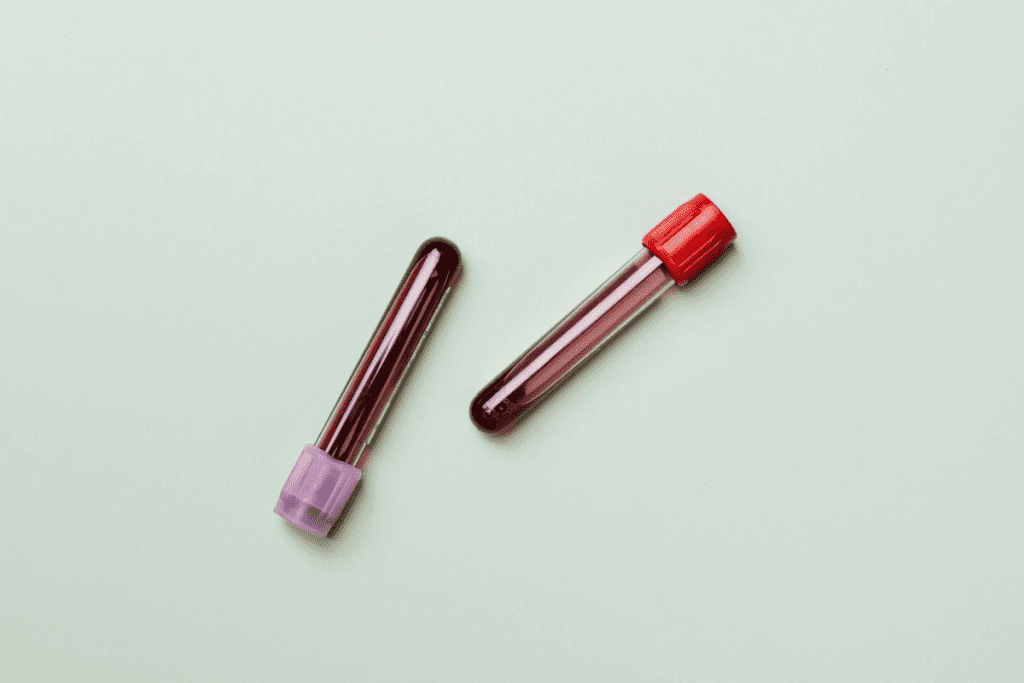Last Updated on November 20, 2025 by Ilayda Cengizhan

Being referred to a hematologist can be worrying, if you don’t know why. Hematology is the study of blood, blood-making parts, and blood problems.
Usually, a hematologist is called when blood tests show unexplained results. This expert can diagnose, treat, and manage blood issues. They help catch serious blood problems early.

Knowing about hematology is key to spotting and treating blood issues. Hematology is the study of blood, its problems, and the blood-making organs.
Hematology deals with finding, treating, and managing blood problems. A hematologist is a doctor who knows how to handle issues like anemia, bleeding problems, and blood cancers.
Blood is essential for keeping us healthy. It carries oxygen, fights off germs, and helps us heal. Blood disorders can seriously affect our health, making hematologists very important.
Some key things blood does include:
Understanding blood’s role shows how complex blood disorders are. It highlights the need for expert care.
Many things can lead to a visit to a hematologist. This includes odd blood test results and strange symptoms. A hematologist is a doctor who knows a lot about blood disorders.
Odd blood test results often mean you need to see a hematologist. For example, low red blood cells or weird white cell counts might show a blood problem.
If your blood tests show something off, like anemia or leukopenia, your doctor might send you to a hematologist. Studies show doctors send about five patients a year for blood cancer checks. This shows how key hematologists are in finding serious blood issues.
Strange signs like long-lasting bruises, bleeding, or tiredness can also lead to a hematologist visit. These signs might mean you have a blood disorder. A hematologist can run more tests to find out why and figure out how to treat it.
Having a family history of blood problems is another reason to see a hematologist. If your family has conditions like hemophilia or sickle cell disease, your doctor might suggest a hematologist visit. They can check your risk and talk about ways to prevent or treat it early.
Knowing why you need to see a hematologist can help you get ready. Working with your hematologist means you get the right care for your blood health issues.

Knowing why you’re seeing a hematologist can make your visit easier. A hematologist is a blood specialist who deals with blood disorders. They play a key role in your health care.
Research shows 50%-70% of referrals to specialists might not be needed. But, referrals to hematologists are usually well thought out by your primary doctor.
Your primary doctor looks at your medical history, symptoms, and test results. If you show signs of anemia, they might send you to an anemia specialist.
Your primary doctor will share important details with the hematologist. This includes your medical history, current symptoms, and test results. This helps the hematologist understand your situation fully. Knowing what does a hematologist do helps you see their importance in your health care.
Some blood-related disorders are more likely to need a visit to a hematologist. Hematology is the study of blood and its disorders. It covers many conditions that affect blood cells and the organs that make them.
Anemia is when you have too few red blood cells or not enough hemoglobin. It can make you feel tired, weak, and short of breath. Anemia can be caused by iron or vitamin deficiencies, or by chronic diseases. A hematologist can help diagnose and treat anemia and related conditions like sickle cell disease and thalassemia.
Abnormalities in white blood cells can signal infections, inflammation, or blood cancers like leukemia. A hematologist can run tests to find the cause and create a treatment plan. These issues can include neutropenia, where there are too few neutrophils, or lymphocytosis, where there are too many lymphocytes.
Platelet disorders can cause bleeding problems. For example, thrombocytopenia is when there are too few platelets, and thrombocytosis is when there are too many. A hematologist can diagnose and manage these conditions. They may need treatments to prevent bleeding or clotting issues.
In summary, conditions like anemia, white blood cell abnormalities, and platelet disorders often need a hematologist’s help. Understanding these conditions and the role of a hematologist can help patients get the right care and treatment.
Understanding what happens at your first hematology appointment can make you feel more comfortable. Your hematologist is a blood disorder specialist. They aim to diagnose and treat blood-related conditions.
Your hematologist may run several tests to understand your condition. These tests include:
Your hematologist will ask you questions to provide the best care. Be ready to talk about:
To get the most from your first hematology appointment, prepare well. Here are some tips:
Hematologists are key in finding and treating serious blood issues. These problems can greatly affect a person’s health. They use their special knowledge to create effective treatment plans.
Hematologists diagnose blood cancers like leukemia and lymphoma. Leukemia affects the blood and bone marrow. Lymphoma targets the immune system. They work with patients to find the best treatment, which might include chemotherapy or bone marrow transplants.
Hematologists also handle bleeding and clotting issues, like hemophilia and thrombophilia. These can lead to serious health problems. They use tests to find the cause and create a treatment plan.
Bone marrow problems, such as myelodysplastic syndromes and myeloproliferative neoplasms, are another area of focus. These can cause anemia, infections, and bleeding. Hematologists help by suggesting treatments like medication or bone marrow transplants.
In summary, hematologists are vital in treating serious blood issues. They help with blood cancers, bleeding and clotting disorders, and bone marrow problems. Knowing their role helps patients understand their diagnosis and treatment better.
Hematologists work with a team of specialists to care for patients. This team effort makes sure patients get treatment plans that fit their needs.
A hematologist teams up with oncologists, radiologists, and primary care doctors. Liv Hospital shows its commitment to excellence by using the newest academic methods. This means patients get top-notch care.
Good teamwork is key in hematology care. This means:
Hematologists keep up with new discoveries in their field. They do this through ongoing learning and research. This helps them offer patients the best and newest treatments.
Learning about the hematology referral process can make you feel less anxious. It helps you get the care you need. A hematologist, or blood doctor, deals with blood disorders. Getting referred to one is important for your health.
Knowing what hematology is and why you might get referred can help you. It’s about studying blood and its problems. This includes anemia, bleeding issues, and blood cancers.
At your first visit, you’ll have tests and talk about your health history. Being ready and informed helps you work well with your hematologist. This way, you can manage your condition and get the best care.
Being confident in your hematology referral is key to good treatment. Understanding your hematologist’s role and what to expect makes the process smoother. This ensures you get the care you need.
A hematologist is a doctor who focuses on blood-related issues. This includes blood disorders and cancers.
Hematology is the study of blood and blood disorders. It also looks at blood-forming organs.
You might see a hematologist if your doctor thinks you have a blood issue. This could be anemia, a bleeding disorder, or blood cancer.
Issues like anemia, white blood cell problems, platelet disorders, and bleeding issues might lead to a visit.
At your first visit, your hematologist will ask about your health and symptoms. They will also do a physical exam and might order tests like blood counts or bone marrow biopsies.
Hematologists use tests like blood counts, bone marrow biopsies, and genetic testing. These help diagnose and manage blood conditions.
They use tests, your medical history, and physical exams to diagnose and manage serious conditions. This includes blood cancers, bleeding disorders, and bone marrow issues.
Hematologists are key in diagnosing and treating blood cancers like leukemia and lymphoma. They create treatment plans and monitor the disease’s progress.
Subscribe to our e-newsletter to stay informed about the latest innovations in the world of health and exclusive offers!